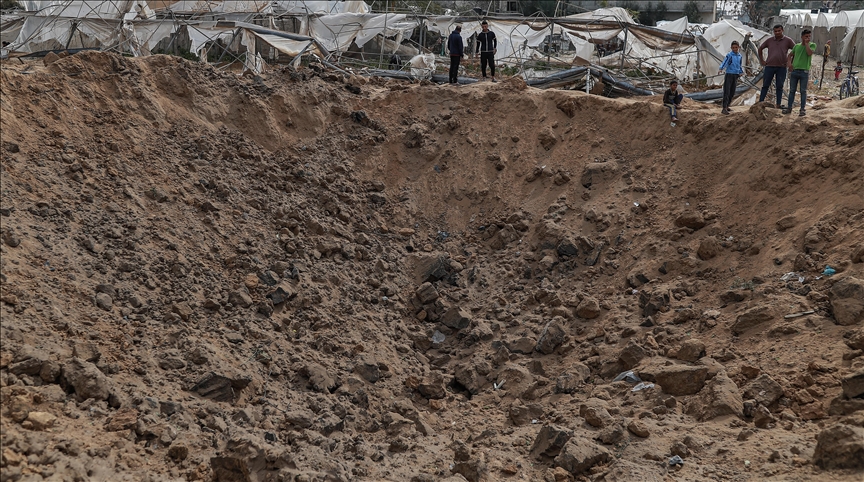The Palestinian struggle for land continues as Palestinians commemorate the Nakba, or “catastrophe,” which refers to the mass displacement of Palestinians from their homeland. This year marks the 76th anniversary of this pivotal event, and Palestinians persistently hold on to what remains of their once bountiful agricultural country.
“Land grabbing is the core of the whole conflict between Israel and Palestine, and it is the core of Palestinian resistance for our freedom and liberation of our land from occupation. By cultivating the land, we aim at protecting the land from being stolen or confiscated by the settlers or by the Israeli military”, Abbas Milhelm of the Palestinian Farmers’ Union (PFU) explains. PFU is a broadly recognized Palestinian farmers’ network, which represents farmers through active district farmers’ associations in all agricultural sectors and communities.
The struggle for land remains central to the Palestinian quest for freedom and liberation from occupation. Through resilience, advocacy, and strategic actions, Palestinian farmers continue to assert their right to the land they cultivate.
Land dispossession and impacts on agriculture
For decades, armed Zionist groups incrementally seized Palestinian lands to establish and expand settlements. The situation escalated with the Israeli military occupation, which began in October of the previous year. Larger numbers of settlers were deployed in Palestinian territories, leading to the annexation or confiscation of significant portions of land.
Agriculture is a vital component of the Palestinian economy and a crucial source of food security. However, the occupation has severely damaged the agricultural sector. Bulldozing and destruction have rendered many agricultural lands unsuitable for farming.
- Gaza Strip: Daily agricultural losses in the Gaza Strip amount to $1.6 million due to production disruptions caused by Israeli occupation. Olive farmers have been unable to reach 40% of the expected 2023 olive harvest. Over 850 trees were uprooted or burned, including 473 olive trees. Theft of livestock and farming equipment further compounds the challenges faced by Palestinian farmers.
- West Bank: Settler violence against farmers has escalated, resulting in restricted access to approximately 13,400 hectares of land between October 7 and November 2023. A staggering one million trees were lost due to this prevention of access. Furthermore, 1,149 individuals from 15 Bedouin and farming communities were forcibly displaced, often unable to take their possessions with them.
- Area C: This region, comprising fertile soil and essential water resources, constitutes 60% of Palestinian land. Unfortunately, it is now under complete control of settlers, with support from the Israeli military.
Farmers’ resilience and strategies
Despite the desecration of their agricultural lands, Palestinian farmers remain steadfast in defending their rights. The PFU, Abbas pointed out, employs several strategies:
- Land cultivation: PFU promotes land cultivation to protect agricultural lands. By actively working the land, farmers aim to prevent theft or confiscation by settlers or the Israeli military.
- Infrastructure support: The organization constructs and rehabilitates agricultural roads, ensuring farmers’ access to vital water resources for irrigation. Strengthening control and ownership of farmlands is a priority.
- Documentation and awareness: PFU documents violence against farmers and publishes monthly updates on land rights violations in two languages. These reports are shared with international solidarity movements, raising awareness about the Palestinian cause. Solidarity movements also exert pressure on governments to support Palestinian rights.
- Legal assistance: PFU connects farmers with law institutions and firms offering legal services. These resources help farmers in their legal battles against those guarding, confiscating, and annexing their land.
Through these various strategies, the PFU has achieved notable successes in specific areas, including the Jordan Valley—a part of Area C. PFU provided seeds, irrigation, and roads to rescue the land from potential confiscation. These 350 hectares, previously cultivated only in 2022 and threatened with confiscation, are now utilized for growing various vegetables. PFU aims to replicate these positive outcomes in other regions.
Despite their efforts, Palestinian farmers face significant challenges. Israeli forces frequently attack them, resulting in fatalities. The exact number of farmers killed by the Israeli military remains unknown, and many are still missing. Settlers carried out 750 attacks against Palestinians in the West Bank between October 7 and December 2023. Abbas emphasizes the Israeli government’s accountability, particularly its role in financing violence perpetrated by settler leaders.
Global solidarity for Palestine
Movements have successfully lobbied major monopoly companies to cease investments in settlements and occupation. They advocate for imposing sanctions on any activities involving companies, governments, or organizations collaborating with Israeli settlement entities. Efforts have led to actions against settlers, including designating them as terrorists. This accountability ensures that their crimes against Palestinian farmers do not go unnoticed. Imposing actions and sanctions on settlers and their leaders is essential to safeguard what remains in the West Bank.
PFU recognizes that supporting farmers against land grabbing requires collective efforts, both nationally and internationally.
“We call upon all the solidarity movements eager to help stop land grabbing, confiscation, and annexations through lobbying and advocacy around the world. Without holding the settlers and government accountable for what they are doing in terms of land grabbing, nothing will stop this occupation. This is the time of doing, not the time of talking. We need actions that would really bring the world’s attention to what’s happening on the ground,” Abbas stressed.
This article is based on the input of the Palestinian Farmers Union (PFU) in the Landless Voices Consultation on Land and Resistance on May 6, 2023, and from PFU’s short documentary about the state of agriculture of occupied Palestine. The Landless Voices consultation series is part of the Global People’s Caravan for Food, Land, and Climate Justice (GPC) campaign that PAN Asia Pacific (PANAP) and other global and regional groups are leading.








Discussion about this post